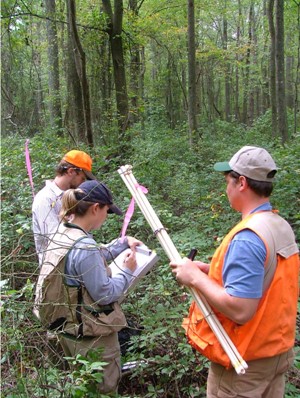By understanding the health of our wetlands, we also can better understand how to restore them and protect them from actions that cause damage..
Alison Rogerson
Delaware Wetlands
302-739-9939
Wetlands provide many important services to humans and the environment, including: improving water quality, providing habitat for fish, wildlife and rare plants, protecting us from flooding and storm damage, and providing open space on the landscape.
The less healthy a wetland is, the less likely it is that it can provide important ecological services to its fullest capabilities
The data obtained by DNREC from assessing wetlands is being used to design wetland restoration plans for watersheds and to better understand how certain land use decisions affect the health of our wetlands.
 The procedures below are the tools we use to assess the health of our wetlands. The data collected in the field is analyzed at the office to assign scores or rankings that indicate the health of the wetland. Different procedures are used for different wetland habitats and to obtain varying levels of data.
The procedures below are the tools we use to assess the health of our wetlands. The data collected in the field is analyzed at the office to assign scores or rankings that indicate the health of the wetland. Different procedures are used for different wetland habitats and to obtain varying levels of data.
Comprehensive assessments are used to extensively document the health of a wetland along with the stressors that might be impacting it. Comprehensive assessments require more time and staff than rapid assessments conducted in the field.
The detailed data from the comprehensive assessments help to ensure that our less-extensive rapid assessments are collecting valid data that is comparable to the more detailed comprehensive surveys. The comprehensive procedure can produce scores for certain wetland functions (services), including habitat, plants, hydrology, buffers, and soil cycling.
The Delaware Comprehensive Assessment Procedure (DECAP) is a comprehensive assessment method for collecting data that can be used to determine the condition of a wetland site relative to reference condition (closest to natural and undisturbed).
DECAP can be used to assess flat, riverine and depressional nontidal wetland subclasses in the Coastal Plain of Delaware and Maryland.
Please contact the DNREC/ Watershed Assessment Section for the most recent versions of the scoring protocols.
The Delaware Rapid Assessment Procedure (DERAP) is a rapid field method for determining the general condition of a wetland site.
The DERAP can be used in flat, riverine, and depressional wetlands in Delaware and Maryland.
Guidance for Rating Wetland Values in Delaware is available to be used with the condition-based DERAP protocol.
The Values protocol estimates societal, ecological, and economic benefits provided by wetlands non-tidal wetlands in Delaware.
The MidAtlantic Tidal Rapid Assessment Method (MidTRAM) is a rapid protocol for assessing the condition of estuarine emergent tidal wetlands in Delaware, Maryland, and Virginia.
The MidTRAM is validated with intensive biological data based on the bird community and biomass levels.
Related Topics: assessment, health, monitoring, watershed, wetlands